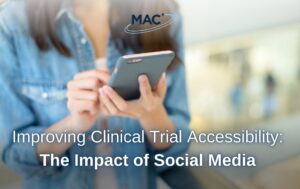Research Appreciation Day provides an opportunity to acknowledge the profound impact of clinical trials in advancing medical knowledge and improving patient care.
This year, we’re joining in the celebrations of the first-ever Research Appreciation Day, run by MQ Mental Health1, celebrating, and recognising the importance of research throughout the week. The inaugural awareness day is a day to celebrate the work of countless health researchers all over the world making a difference to people’s lives through bettering healthcare options.
One of the main ways healthcare research is conducted is through clinical trials. Clinical trials are essential for evaluating the safety and efficacy of new health treatments, medications, and medical devices. These trials, conducted with meticulous planning and rigorous scientific methodologies, pave the way for groundbreaking discoveries and shape the future of healthcare.
According to the NIHR2, between April 2022 and March 2023, almost one million people took part in clinical research across England. They reported that in this time, over 100 people in England were enrolled every hour to take part in health and care research. That’s enough people to fill Wembley Stadium over 10 and a half times.
Without these trials, medical practice would rely solely on anecdotal evidence and speculative assumptions, compromising patient safety and hindering advancements in healthcare. As the slogan for Research Appreciation Day goes: “without research, it’s just guesswork”.
Not only do clinical trials allow healthcare professionals to explore new therapeutic approaches, bringing cutting-edge discoveries from laboratories to real-world applications, but they also allow to test existing medications for different diseases and conditions. This is known as drug repositioning3. For example, the erectile dysfunction medication sildenafil4 (better known by its trade name Viagra) was first trialled in a clinical environment as a treatment for high blood pressure. When the male participants in the trial reported unprovoked, long-lasting erections, the drug was investigated for this use. Since its commercial release, it has improved the sex lives of millions of men worldwide.
Clinical trials open up avenues to explore novel therapeutic approaches, innovative medical devices, and breakthrough treatments, holding the potential to improve, and even save, countless lives.
The patients are always at the centre of every clinical trial: the patients in the future who could potentially benefit from the treatment being assessed, but primarily, the patients taking part in the trial, with medics always ensuring their safety and wellbeing.
Prior to conducting trials, thorough protocols are developed to safeguard the rights, health, and interests of participants. These protocols outline the purpose of the study, inclusion and exclusion criteria, potential risks and benefits, and the informed consent process.
Furthermore, by involving diverse groups of participants, clinical trials also contribute to understanding how different populations respond to treatments, leading to more personalised and effective healthcare approaches, and helps in efforts to reduce health inequalities.
Another area wherein clinical trials have had a positive impact is on government healthcare policies and guidelines. Government agencies, regulatory bodies, and medical associations rely on the evidence generated through clinical trials to make informed decisions about medication approvals. By contributing to the body of knowledge that shapes healthcare policies, clinical trials play a crucial role in improving healthcare access, affordability, and overall patient outcomes. The NHS5 has reported that clinical research is of benefit to their operation, stating that hospitals that are more ‘research active’ have lower mortality rates than those that are not.
Research Appreciation Day serves as a reminder of the invaluable contributions clinical trials make to medical research and patient care.
If you want to make a difference to the future of healthcare and play a more active role in your own healthcare, you can learn more about paid clinical trial opportunities near you by visiting our current studies page.
Sources
1 MQ Mental Health – Research Appreciation Day
2 NIHR – Annual Statistics 2022/23
3 MAC Clinical Research – What is Drug Repositioning
4 The Guardian – From Viagra to Valium, the drugs that were discovered by accident
5 NHS – What does the new clinical research vision mean for NHS patients and health professionals?






